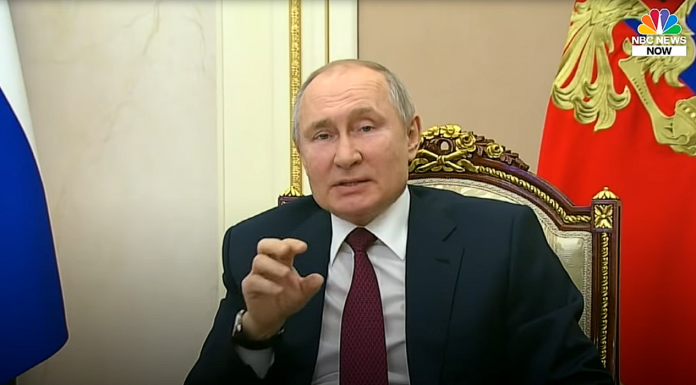Domestic terrorism groups like Antifa and Black Lives Matter are not the only security threat facing America.
Under the Biden administration, there is growing concern about the illegal entry of bad actors from hostile foreign nations, as well.
House Minority Leader Kevin McCarthy recently called attention to the entry of two Yemeni nationals on the terrorist watch list.
And on Monday, former president Donald Trump issued a statement calling on his successor, President Joe Biden, to reinstate his travel ban on countries that offer safe harbor to Islamic terrorism groups.
“If Joe Biden wants to keep our Country safe from Radical Islamic Terrorism, he should reinstitute the foreign country Travel Ban and all of the vetting requirements on those seeking admission that go with it, along with the refugee restrictions I successfully put in place,” Trump wrote in the statement.
“Terrorists operate all over the world and recruit online,” he continued. “To keep terrorism and extremism out of our Country, we need to have smart, commonsense rules in place so we don’t repeat the many immigration mistakes made by Europe…”
But amid talk of some 2 million illegals on pace to cross the southern border this year—many of them being released into the US with no processing, court hearing or even coronavirus test—immigration officials took at least one threat seriously.
After a Russian national fleeing the Putin regime due to religious persecution attempted to re-enter the US, he was shot.
Evgenii Glushchenko came to United States seeking asylum because he is a member of the Jehovah’s Witnesses, which Russia banned in 2017 and declared to be an extremist organization.
Now, he faces charges for assaulting a federal agent—although he hopes to see them dismissed as part of a recent plea deal.
Glushchenko acknowledged during a court hearing Tuesday in Tucson that he illegally crossed the border east of Lukeville, Arizona, in November 2019. He was shot in the thigh by a Border Patrol agent who tried to apprehend him.
His plea agreement calls for a sentence of time already served and said a charge of assaulting a federal agent against Glushchenko will be dismissed at sentencing, which is scheduled for June 29.
“I admit my guilt,” Glushchenko said through an interpreter.
About five months before the shooting, Glushchenko lost 25% of his body weight as he refused to eat until he was released from detention, leading a judge to give authorities the power to force-feed Glushchenko.
Once deported to Russia, Glushchenko resurfaced in Arizona several months later and was injured in the shooting.
Authorities say Glushchenko ran from a Border Patrol agent, resisted the officer’s attempt to handcuff him and pulled the radio off his belt. They say Glushchenko then grabbed the agent’s genitals, leading the officer to shoot Glushchenko.
In his earlier arrest that led to the hunger strike, his lawyers had said Glushchenko and his wife had fled Russia to Mexico after receiving “repeated government death threats” because of his work with western charities and refusal to pay bribes to the Federal Security Service, a Russian intelligence agency.
Prosecutors said investigators later discovered Glushchenko wasn’t actually married to the woman with whom he had a child. In any case, the woman is seeking asylum, according to court records.
Although Glushchenko’s prior arrests occurred during the Trump administration, amid an atmosphere of much tighter border security, his case is unlikely to draw any leniency under Biden as tensions with Russia reach a new boiling point.
Both Biden and Russian President Vladimir Putin have engaged in a tough-talking war of words, which has seen Democrats attempt, yet again, to resurrect dubious claims of Russian interference in recent US elections.
After Biden imposed sanctions last week—including the expulsion of Russian diplomats—over claims of Russian meddling and involvement in a massive cyber-attack, Putin responded in kind.
That led several critics to express alarm that a war could break out as a result of the diplomatic friction.
“Biden often talks provocatively—while carrying a twig,” wrote Victor Davis Hanson for the National Review. “He has gratuitously called Putin ‘a killer.’ And he warned that the Russian dictator ‘will pay a price’ for supposedly interfering in the 2020 election.”
In addition, Putin is continuing to amass troops at Russia’s border with Ukraine and to posture himself as if ready to escalate tensions in the ex-Soviet satellite, where Biden’s family members have maintained private business interests.
“Joe Biden, and those around him, seem determined to upset the peace they inherited,” wrote Hanson.
Biden’s erratic decision to elevate regional tensions while scaling back US military presence in another Russian neighbor, Afghanistan, could boost the chances of drawing the US into another global war.
But a truly tactical move on Putin’s part could be sending waves of asylum-seekers to infiltrate the US border, creating a win–win for Republican Trump supporters.
The arrival of Russians—who could potentially vote Republican, thus undermining the Left’s open-border strategy—may help mitigate the flood of Central American, Asian and African refugees seen as a key Democrat demographic.
More than likely, however, it would force the Biden administration’s hand in finally addressing the security crisis he created.
Adapted from reporting by the Associated Press

